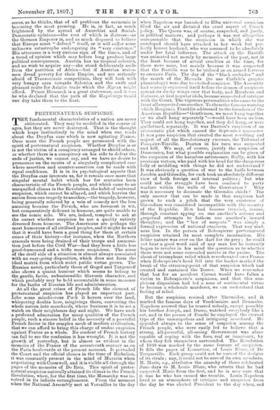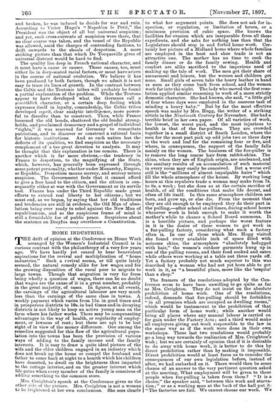PRETERNATURAL SUSPICION.
THE fundamental characteristics of a nation are never obliterated. They may be modified in the course of ages, but they are never destroyed. That is the thought which leaps instinctively to the mind when one reads about the Dreyfus case which is now agitating France. Once more the French people are permeated with the spirit of preternatural suspicion. Whether Dreyfus is or is not the victim of a conspiracy arranged to shield others, or whether there is a conspiracy on his side to defeat the ends of justice, we cannot say, and we have no desire to pronounce on the merits of a singularly complicated case where assertion and counter-assertion can be made with equal confidence. It is in its psychological aspects that the Dreyfus case interests us, for it reveals once more that singular mental habit which has for centuries been characteristic of the French people, and which came to an unequalled climax in the Revolution, the habit of universal suspicion, which cannot be allayed, and which hurries the nation from one tragedy to another,—the tragedy, however, being generally relieved by a vein of comedy not the less amusing because the French, who are foremost in wit, but comparatively deficient in humour, are quite unable to see the comic side. We are, indeed, tempted to ask at the outset whether suspicion be not a quality entirely divorced from humour. The Americans are perhaps the most humorous of all civilised peoples, and it might be said that it would have been a good thing for them at certain crises of their history—for instance, when the Northern arsenals were being drained of their troops and ammuni- tion just before the Civil War—had they been a little less good-humoured and a trifle more suspicious. The sense of the droll side of a situation is almost always associated with an easy-going disposition, which does not form the ideal matrix from which strict public virtue grows. The Russian novel, particularly those of Gogol and Turgenieff also shows a quaint humour which seems to belong to the gentle, facile, unbusinesslike Slavonic character, and which probably may be held accountable in some measure for the faults of Russian life and administration.
At all the great crises of French life the element of preternatural suspicion has played an important part. Like some mischievous Puck it hovers over the land, whispering doubts here, misgivings there, converting the whole nation into mouchards, whose business it is to set a watch on their neighbours day and night. We have such a profound admiration for many qualities of the French people, such a sincere belief in the necessity of a powerful French factor in the complex mesh of modern civilisation, that we can afford to bring this charge of undue suspicion against France as a whole. No student of French history can fail to see the confusion it has wrought. It is not the growth of yesterday, but is almost as evident in the memoirs of the France of the seventeenth century as on the Paris boulevards at the present moment. It pervaded the Court and the official classes in the time of Richelieu, it was constantly present in the mind of Mazarin when negotiating with Cromwell, and it is visible all through the pages of the memoirs of De Retz. This spirit of preter- natural suspicion naturally attained its climax in the French Revolution, when, for the first time, the Monarchy was in- volved in its infinite entanglements. From the moment when the National Assembly met at Versailles to the day when Napoleon was banished to Elba universal suspicion filled the air and dictated the cruel aspect of French policy. The Queen was, of course, suspected, and justly, in political matters ; and perhaps it was not altogether unreasonable that the suspicion in which she was enveloped should have attached to her weak but per- fectly honest husband, who was assumed to be absolutely under her fatal influence. The attack on the Bastille was animated not merely by memories of the past, not in the least because of actual cruelties at the time, for there were none, but mainly because it was suspected that the Bastille was to be utilised as an armed fortress to overawe Paris. The day of the "black cockades" and the march of the Monads (to use Carlyle's graphic phraseology) were due to excited suspicion. The Assembly had scarcely organised itself before the demon of suspicion spread its dusky wings over that body, and Mirabeau and Barnave, at first popular idols, became suspected of intrigue with the Court. The vigorous personalities who came to the front all suspected one another. To them the famous warning which Benjamii-i Franklin addressed to the founders of the American Republic—" Gentlemen, we must hang together or we shall bang separately "—would have been useless. They could not hang together, and they did hang, or were guillotined, separately. It was Danton's suspicion of an aristocratic plot which caused the September massacres. It was pure suspicion that created the most revolting and unjust of all the Revolutionary excesses, the Tribunal of
Daaition in his turn was suspected and fell. We may, of course, justify the suspicion of Dumouriez, but what possible explanation can be given of the suspicion of the harmless astronomer, Badly. with his precisian virtues, who paid with his head for the dangerous folly of meddling with things he did not understand ? It was obviously a question of war to the knife between Jacobin and Girondin, for each took an absolutely different view of both foreign and internal politics ; but why could not the struggle have been confined to party warfare within the walls of the Convention ? Why was it necessary to decimate the Girondin chiefs ? The only answer that can be made is that suspicion had grown to such a pitch that the very existence of Girondism was considered incompatible with the security of the Republic. Men bad become frenzied, insane, through constant spying on one another's actions and perpetual attempts to fathom one another's inward thoughts ; and the "law of suspects" was simply a formal expression of national craziness. That way mad- ness lies. In the person of Robespierre preternatural suspicion attained its most complete incarnation. His feline nature was ever on the dart for its prey ; he could not hear a good word said of any man but he instantly began to revolve in his mind the question as to whether there were not some concealed motive in the praise. The shout of triumphant relief which reverberated over France - when Robespierre's head fell into the basket marked the break of the straining-point of that suspicion which had created and sustained the Terror. When we remember that but for an accident Carnot would have fallen a victim to Robespierre's suspicions, and that this sus- picious disposition had led a man of sentimental virtue to become a wholesale murderer, we can understand that feeling of relief.
But the suspicion revived after Thermidor, and it marked the famous days of Vend6miaire and Brumaire. Napoleon avowed that he trusted nobody, except possibly his brother Joseph, and Puree, watched everybody like a cat, and in the person of FouchtS he employed the eternal type of the unscrupulous and intriguing mouchard. He appealed always to the sense of suspicion among the French people, who were easily led to believe that a strong, all-powerful, all-seeing Government was alone capable of coping with the foes, real or imaginary, by whom they felt themselves surrounded. The Revolution of 1848 was marked by the same feature of suspicion. It fills the pages of Laniartine, of Louis Blanc, of De Tocqueville. Each group could not be sure of the designs of its rivals ; nay, it could not be sure of its own members. M. Marie, e.g., attributes the anarchy of those celebrated June days to M. Louis Blanc, who retorts that he had suspected Marie from the first, and he is now sure that it was he who has caused the trouble. Louis Napoleon lived in an atmosphere of intrigue and suspicion from the day he was elected President to the day when, sad and broken, he was induced to decide for war and ruin. According to Victor Hugo's " NapoliSon le Petit," the President was the object of all but universal suspicion; and yet, such cross-currents of suspicion were there, that no clear course was taken, and the vessel of the Republic was allowed, amid the charges of contending factions, to drift onwards to the shoals of despotism. A more striking picture than that which De Tocqueville gives of universal distrust would be hard to find.
The quality lies deep in French national character, and it must have a cause or causes. Those causes, too, must either lie in deep-seated racial factors, or must have arisen in the course of national evolution. We believe it has been produced by both factors, though we admit it is not easy to trace its lines of growth. In the contrast between the Celtic and the Teutonic tribes will probably be found a partial explanation of the problem. While the Teutons appear to have developed what the Germans call a gemiithlich character, or a certain deep feeling which expresses itself in loyalty, comradeship, the Celtic tribes developed esprit, clear analytic intelligence, more power- ful to dissolve than to construct. Thus, while France loosened the old bonds, shattered the old feudal strong- holds, and proclaimed democracy and a gospel of individual "rights," it was reserved for Germany to resuscitate patriotism, and to discover or construct a rational basis for historic institutions. And as each nation has the defects of its qualities, we find suspicion as the necessary complement of a too great devotion to analysis. It may be thought that this explanation is too remote. There is another which is far more obvious,—the tendency in France to despotism, to the magnifying of the State, which, however, has generally been expressed through some potent personality, whether under Monarchy, Empire, or Republic. Despotism means secrecy, and secrecy means suspicion. The Government feels that it cannot afford to give a free hand to the citizen, and the citizen is con- sequently either at war with the Government or its servile tool. France has under the Third Republic made great efforts to extend real liberty to her citizens ; but we must end, as we began, by saying that her old traditions and tendencies are still in evidence, the Old Man of abso- lutism being ever ready to rebel against the New Man of republicanism, and so the suspicious frame of mind is still a formidable foe of public peace. Suspicions about the sentence on Dreyfus may overthrow a Constitution.







































 Previous page
Previous page